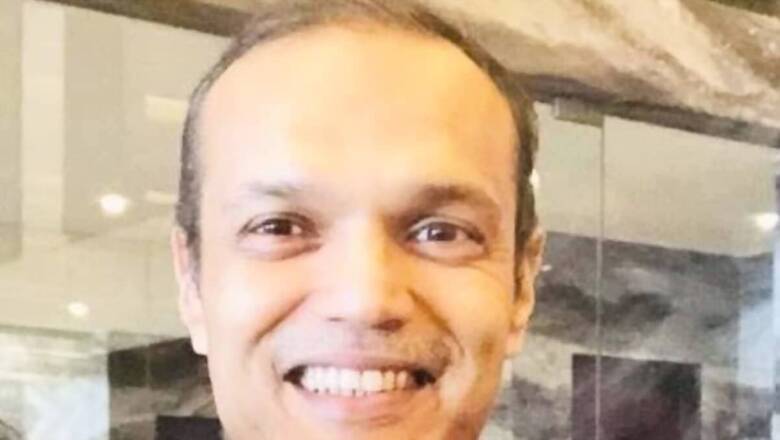
views
Morgan Stanley’s latest report shows India driving a fifth of global growth by the next decade, which is a big fillip to the Narendra Modi government. However, it predicted a fragmented outcome in the 2024 Lok Sabha elections. News18 spoke to Morgan Stanley India Managing Director Ridham Desai, who called Prime Minister Modi an ‘inflation hawk’, which essentially means he does not want inflation — this is critical for the prosperity of the economy. Desai also praised India for focusing on macro stability when countries like the US were dealing with inflation during the pandemic.
When asked about the “fragmented" verdict in the 2024 elections, Desai explained when a coalition government is formed by a minority party, a lot of focus is on managing politics than the economy. So, the country needs a majority government, which will focus on the economy rather than just politics.
In the backdrop of the Russia-Ukraine war, Desai said India has to rely more on the domestic economy, as PM calls “Atmanirbhar Bharat". Although India has managed the crude oil situation well, it needs to be concerned about geo-politics, he warned.
Edited interview
Q: Your report says that Morgan Stanley ran into significant scepticism about India, particularly, with overseas investors who say that the country has not delivered its potential in spite of it being the second largest growing economy. What according to you and your research did India do right in the last nine years which it did not do earlier?
A: Lots of things have happened, actually. I think, first of all, India has focused on macro stability, so if I were to use from an economic perspective I would clearly characterise the Prime Minister as an ‘inflation hawk’, which means that he doesn’t want inflation. This is very critical for the prosperity of the economy. In order to achieve that he actually changed the mandate of the central bank. So, the Reserve Bank of India (RBI) is solely focused on producing lower inflation outcomes and the best result of this was seen during the pandemic. While the world at large was facing runaway inflation, you know countries like US, which face sub 2% inflation, had 9% inflation.
India’s inflation was very modest. Part of this has to do with how the RBI policy was framed and it had to do with how the government protected the poor people during the pandemic. Instead of rolling out cash like most of the western hemispheric countries did, India was actually giving food and that’s not inflation. So that’s the first big change and the seeds of this change was sown in 2013, when the then Federal Reserve Governor just said taper off India’s currency, which was down 20%. RBI was in a spot and had to raise interest rates by 200 basis points overnight. So, India is no longer in that situation. We call this macro stability. So, our macro is much more stable. Second thing is how India does social transfers and I think this is a story missed by headline media in India. The seeds for this was sown when PM Narendra Modi realised we had to accelerate Aadhaar and identify each and every Indian digitally. India’s stand in Aadhaar allows the government to make social transfers very easily without leakages. This was supplemented by enormous efforts by the government to open bank accounts to unbanked and now we are able to do these transfers without age-old leakages and middlemen corruption.
So, the intended beneficiaries are getting what they intended to get. Not only that, the government has also now changed some of these things into delivering in kind rather than just cash because you cannot control how people spend cash but you can send QR codes that could pay the fees of your girl child and that achieves desired outcomes. This is the second big change that I would highlight. Massive improvement in social transfers, which is directly improving the lives of the poor people in India. The third is in change with the macro policy on how the government should interact with corporations. See, ultimately, corporate entities or business are the ones who invest and when they invest they create jobs. When they create jobs you get wages, you get prosperity, it’s a virtue cycle. You can’t achieve this by distributing free money and wages to people. It doesn’t work that way, that creates inflation. This government is very focused on improving the business viability case for India and corporate India is back, in fact multi-national companies are back. We run propriety indicator that suggests that multinational companies’ sentiment in India is at all-time high and they are investing and as this investment cycle rolls out you can see greater prosperity.
These are the three mega headline changes, which are at the helm of the transformation that the Indian economy is facing, and why everybody’s focal point today is around the world at discussing India, and what they should be doing in India and how they should invest, how they should access the Indian market because this is the place where you want to be in the next 10-20 years.
Q: Among the risks that the report listed, two major factors including fragmented verdict in 2024 Lok Sabha polls and then saying a strong government is imperative for India’s growth story?
Q: The way I would characterise this is when you get a coalition government that that is run by a minority party, there is a lot of focus on managing politics, and economy takes a backseat. When you get a majority government, and this is not always the case, the focus is to look at things that the country needs rather than just working on making the government survive. So that’s the importance of delivering a majority verdict. We have seen in the past that India has delivered a few minority government and there have not been good economic outcomes in those years. Being a democracy, we have to deal with this every five years, there’s no guarantee on how voters will show up and vote. It’s a risk we have to keep in mind.
Q: Morgan Stanley had placed India among ‘Fragile Five’ a decade ago, and now it is in the bright spot. Did this report factor in the economic situation in the West, especially the US, in the backdrop of the Russia-Ukraine conflict?
A: There will be a constant challenge for India, if I make a comparison with China, who has been growing rapidly in the past three decades it had the benefit of very strong global growth as a tailwind. India may not have that benefit, this is because the world is aging and the world is burdened with a lot of debt. So, global growth will be slower than when China was emerging out of its status as a poor economy into a developed or developing economy.
India will have to do a lot more hard work and rely a lot more on its domestic economy as the PM says ‘Atmanirbhar’, I think, the context is we have to deliver our prosperity using our own economy rather than depending on what the world will give us. The world will do a little bit here and there but it won’t be as rosy as it was for China, so that is clearly a risk. I don’t think the war brings a lot of risks for India. We have managed the crude oil situation quite well and the intensity of oil in India is anyway declining and it would continue to decline, so we will be less reliant on them, like we were 10 years ago. So, that’s a lesser risk but, generally speaking, geo-politics is a concern. You never know when the next big war will happen or when there will be a world economic crisis, as I said, the world will be less cooperative and we’ll have to do our own lifting. But we are there and we have a strong domestic economy and it is an economy that a lot of MNCs want access to, so its good news.
Q: Self-reliance is not just a slogan but it is about making sure that we are able to sail through the crisis, which is there all over the world. Your report certainly cautions sharp rise in commodity prices due to supply outages and shortages in skilled labour supply could alter the outlook, how important are these issues and what should India do to negate the risk?
A: We can’t do much with commodity prices apart from increasing domestic production so we are doing that. Some of the biggest items on our list are urea, seeds, palm oils and, a lot of domestication of that capacity will take place to the next three to five years. We will reduce our dependence relative to GDP in oil. So, some of these volatile commodities will have a lower share going forward, with reference to labour. This is something we need to keep our eyes on. There will be some gaps, some in demand and supply. When there is a demand for skilled labour and we may not be able to supply. Overall, India has a very good situation with labour supply, we have the best demographics in the world. So, we don’t have a problem in quantity but the quality of labour supply will be a problem and it will have to be managed. I think the private sector will do a bulk of the heavy lifting there rather than the government.



















Comments
0 comment